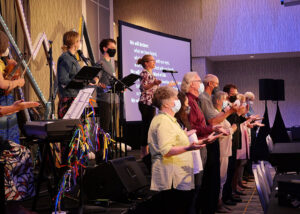Ever since being part of the North American Mennonite Church, I’ve appreciated the cyclical if not constant emphasis on leadership development. Self-development for personal satisfaction, new and increased competency for pastoral and lay leader success, and a wider range of healthier leadership patterns are needed and wonderful. But at the same time it’s caused me to wonder.
Are we simply falling in line with society’s emphasis on personal fulfilment, individualism, power and status? Most likely we’ve seen ads for discipleship training—so we can be leaders. Take a look on the web and figure out the difference between the number of books with leadership or followership in their titles. Study Christian publishing sites. I think what gets published and sold and what we pay attention to is a mark of our Christian culture.
Is our emphasis on “priesthood of believers” really a nice way to Christianize our need to be leaders instead of seeing ourselves first and foremost as followers? Is our teaching and application of “servant leadership” really what we see in the Bible? Does this language and theology stroke our egos? When was the last, or even the first time you saw an advertisement for a seminar, conference, or course on followership?
Despite the value of leadership training, wasn’t Jesus’ first call to be followers? Take Matthew 4:19. Usually the focus has been on Jesus saying, “I will make you fishers of men.” Seldom have I heard a heavier emphasis on Jesus’ preceding words, “Come, follow me.” So shouldn’t we have followership training? Wasn’t the Bible given to us to help us be God followers and sensitive to the Holy Spirit’s leading?
Would we have better pastoral and congregational leaders if congregational members were better followers? Would we have fewer congregational tensions if we had as many working definitions of followership as we do of leadership? And how important is it for every church member to be both a follower and a leader? If we are all leaders, priests, and servants, who are the followers?
James Maroosis says, “The difference between followers and leaders is that followers need leaders to help them follow what leaders themselves are following. This relationship takes the form of a shared responsibility to a shared calling.”
Reverend Paul Beedle has written, “Followership is a discipline of supporting leaders and helping them to lead well. It is not submission, but the wise and good care of leaders, done out of a sense of gratitude for their willingness to take on the responsibilities of leadership, and a sense of hope and faith in their abilities and potential.”
Since, I suspect, most Canadians see themselves as leaders, the time and effort needed to build trust and agree on a vision/mission/purpose/goals for a fellowship of believers is crucial. The Apostle Paul several times reminds us to “make every effort” toward unity and mutual edification so that we are living in peace. Only this can create a church culture and organizational structure where members become active, competent committed followers—and leaders.
Dan Graber is Area Church Minister of Mennonite Church Alberta.







Leave a Reply
You must be logged in to post a comment.